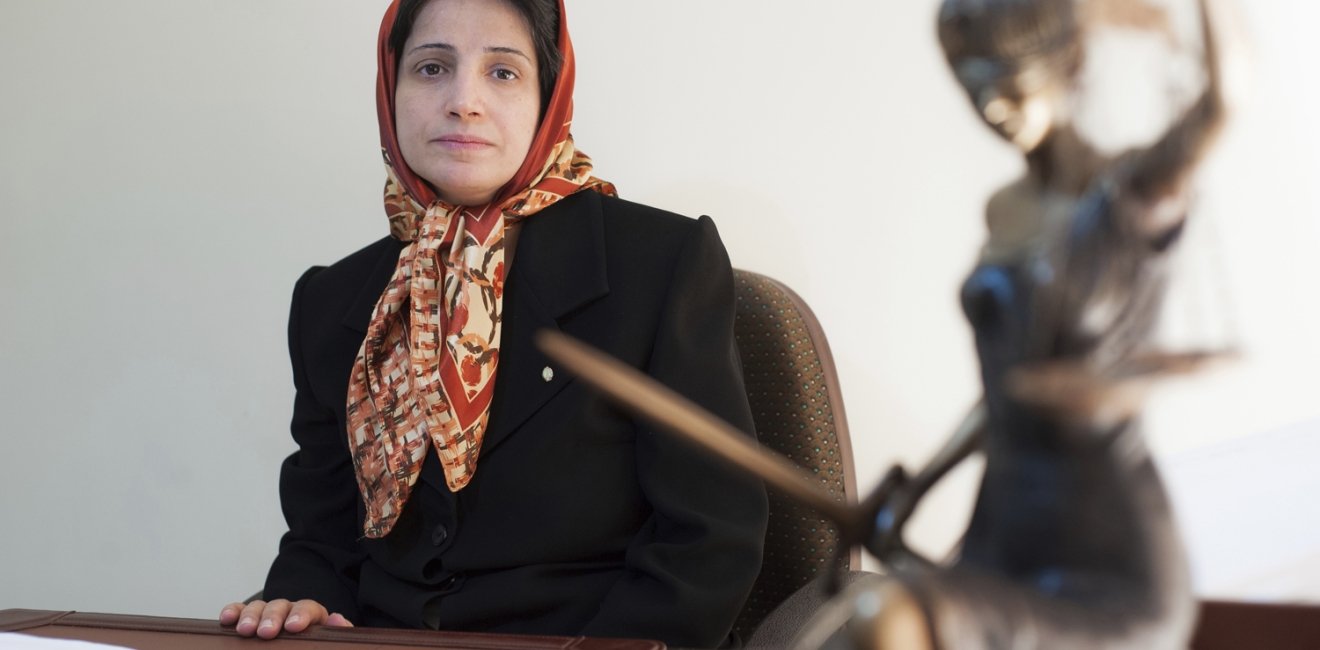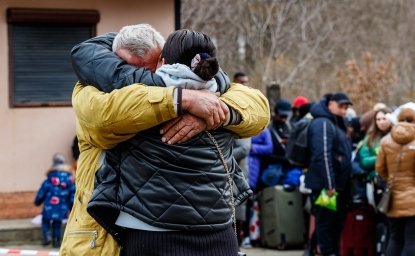Nasrin Sotoudeh, the fearless Iranian human rights lawyer, was sentenced in March 2019 to a lengthy prison term on multiple charges: propaganda against the state, advocating against the death sentence, membership in a human rights organization, appearing in public without the hijab, disturbing public order, and “encouraging corruption and prostitution.” Sotoudeh was already serving a five-year prison sentence, probably for representing a group of women who, in protest against the forced wearing of the hijab, removed their head coverings in public. In the lexica of the Iranian judiciary, removing your hijab in public is equivalent to advocating prostitution.
Her refusal to appear in court probably suited the prosecutor and the judge who no doubt preferred not to face Sotoudeh and hear her demolish their case against her.
Sotoudeh was sentenced in absentia, refusing to appear in court because she was denied a lawyer of her own choice. She was protesting a ruling requiring defendants in political cases to select their lawyers only from a list approved by the judiciary. Her refusal to appear in court probably suited the prosecutor and the judge who no doubt preferred not to face Sotoudeh and hear her demolish their case against her.
The exact length of Sotoudeh’s sentence remains unclear. She told her husband, Reza Khandan, that she had been sentenced to 34 years in prison and 148 lashes. The hardline judge, Mohammad Moghiseh, said on state-affiliated television that she had been sentenced to seven years. This, in any case, came on top of a five-year sentence issued to her in absentia by Judge Moghiseh in 2015, about which she learned only when arrested in June 2018, on a common spate of multiple and baseless charges.
The news of the court’s harsh sentence then resulted in an international uproar. The European Union, the United States, human rights organizations and women activists condemned the sentence and called for Sotoudeh’s release. President Emmanuel Macron of France pointedly invited Sotoudeh to the G7’s Gender Equality Advisory Council.
Her 2018 arrest, alongside the arrest of a number of other human rights lawyers, places Iran solidly among the handful of countries which arrest lawyers simply for defending those accused of political offenses.
Sotoudeh is well known for her advocacy for children’s rights, women’s rights, and human rights. She is a member of a group in Iran opposed to capital punishment. Her long opposition to the obligatory hijab, her defense of political prisoners and minority rights are well-known. She was one of the founders in 2005 of the movement “The One Million Signatures Campaign for Equality under the Law,” which aimed at collecting one million signatures to remove discriminatory laws against women.
Sotoudeh was initially arrested in 2010 and served three years in prison before being suddenly released, on the eve of President Hassan Rouhani’s trip to New York to attend the opening of the UN General Assembly session. Her 2018 arrest, alongside the arrest of a number of other human rights lawyers, places Iran solidly among the handful of countries which arrest lawyers simply for defending those accused of political offenses.
In a letter written from prison on March 6, 2020, on the occasion of International Women’s Day, she described her arrest and conditions in the women’s ward for political prisoners at Evin Prison: “Forty inmates are squeezed into three rooms, the majority of them human rights activists, political activists, women’s rights activists.”
To protest this cruel decision of her jailers and the blatant denial of due process to prisoners, and in a demand for the release of all political prisoners, Sotoudeh went on a hunger strike on August 11, 2020, which appears to continue until today.
She is concerned about the spread of the novel coronavirus. Despite reports on the spread of the virus in prison, the authorities in Evin released many prisoners, but only a limited number of political prisoners. To protest this cruel decision of her jailers and the blatant denial of due process to prisoners, and in a demand for the release of all political prisoners, Sotoudeh went on a hunger strike on August 11, 2020, which appears to continue until today. She is a petite, 57-year old woman who has developed heart problems. After 43 days into her hunger strike, on September 19, she was rushed to Taleghani Hospital. Her family was denied a visit or reliable information about her condition. She was taken back to Evin Prison on September 24, while still requiring medical treatment—treatment the medical clinic at the ward for political prisoners in Evin Prison cannot provide. I know the clinic from my own 105-days stay at Evin Prison in solitary confinement in 2007. It is not equipped to deal with serious problems such as heart failure, the effects of a long hunger strike, or the breathing problems from which Nasrin suffers.
Nasrin’s husband Reza Khandan said in a statement on September 22: “As relatives of Nasrin Sotoudeh, we neither have access to medical documents nor do we have the opportunity to inquire about the treatment or the medical results and findings. As relatives, we are constantly being verbally abused by the security team and threatened with arrest.”
Nasrin Sotoudeh has devoted her life to speaking out against the injustices of the Iranian regime’s systematic violations of human rights, women’s rights, the rights of minorities, political rights, the freedom of speech, and other rights enshrined in the Iranian Constitution. She remains as she has always been—a fighter for these rights; she will continue this struggle no matter how long the authorities keep her in prison. She and other Iranian women activists are models of the women’s struggle for equality and justice in Iran. Women, young and old, look up to Nasrin and these other activists, many also in prison, as their role models.
The international uproar by women’s groups, human rights, and civil society advocates and also by heads of governments, and the expression of concern for Nasrin and other human rights activists, and dual citizens in Iranian prisons, should continue without pause until they are released. This is the least we owe to such outstanding examples of the human aspiration for freedom and the rule of law.
The views expressed in this article are those of the author and do not reflect an official position of the Wilson Center.
The Wilson Center will host a virtual screening of the 2020 documentary film Nasrin, followed by a discussion with Director Jeff Kaufman and Haleh Esfandiari moderated by Merissa Khurma on October 26 at 2 PM ET.






